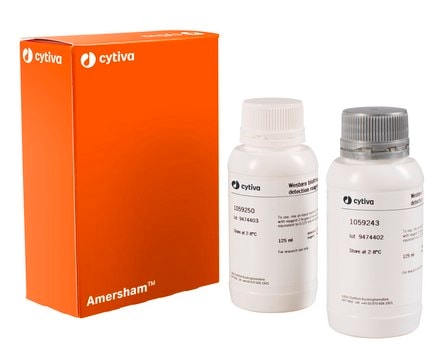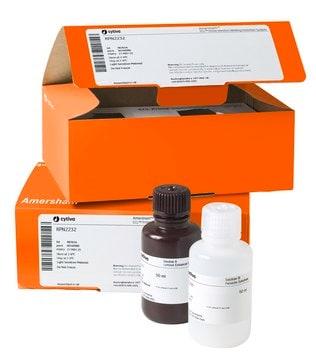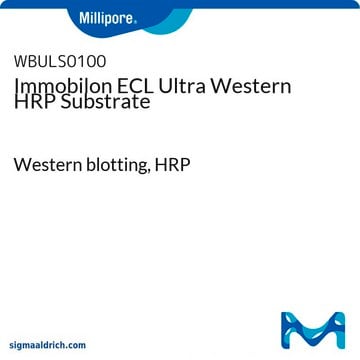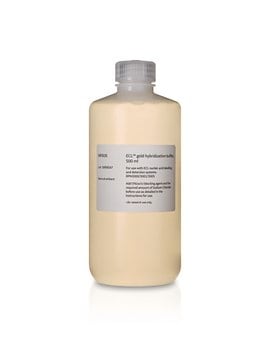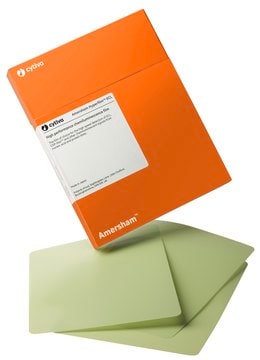GERPN3004
ECL™ Detection Reagents
Cytiva RPN3004, pack of 1 ea
Sign Into View Organizational & Contract Pricing
All Photos(1)
About This Item
UNSPSC Code:
41105300
NACRES:
NA.31
Recommended Products
packaging
pack of 1 ea
manufacturer/tradename
Cytiva RPN3004
storage temp.
2-8°C
Related Categories
General description
The world’s first commercially available chemiluminescent detection reagent for Western blotting. Amersham ECL detection reagent uses enhanced luminol-based detection suitable for all routine confirmatory Western blotting experiments.
Based on the enhanced chemiluminescent reaction of luminol with horseradish peroxidase, ECL substrate can be used to detect probes which have been labelled either directly or indirectly with horseradish peroxidase. Rapid light output enables results to be achieved in 10 to 15 minutes. It is the substrate of choice for target amounts above 500 fg.
High sensitivity and fast results:
Based on the enhanced chemiluminescent reaction of luminol with horseradish peroxidase, ECL substrate can be used to detect probes which have been labelled either directly or indirectly with horseradish peroxidase. Rapid light output enables results to be achieved in 10 to 15 minutes. It is the substrate of choice for target amounts above 500 fg.
High sensitivity and fast results:
- Detects up to 10 to 12 ng of protein, which is ~10× more than colorimetric methods
- Optimized to use with Amersham Protran nitrocellulose (NC) membranes
- Delivers results in just a few minutes, then image using a CCD imager like the Amersham ImageQuant 800 or Amersham Hyperfilm ECL
Storage and Stability
Please be aware this product may be shipped 90 days before the expiration date. For more information on the batch specific expiration date, please contact technical service.
Analysis Note
To view the Certificate of Analysis for this product, please visit www.cytiva.com.
Legal Information
ECL is a trademark of Cytiva
related product
Product No.
Description
Pricing
Storage Class Code
12 - Non Combustible Liquids
Certificates of Analysis (COA)
Search for Certificates of Analysis (COA) by entering the products Lot/Batch Number. Lot and Batch Numbers can be found on a product’s label following the words ‘Lot’ or ‘Batch’.
Already Own This Product?
Find documentation for the products that you have recently purchased in the Document Library.
Customers Also Viewed
Senia Rosales et al.
BMC microbiology, 10, 208-208 (2010-08-04)
Tuberculosis persists as a public health problem in Honduras. A better knowledge of the molecular characteristics of Mycobacterium tuberculosis strains will contribute to understand the transmission dynamics of the disease within the country. The aim of this study was to
C Couturier et al.
Arteriosclerosis, thrombosis, and vascular biology, 20(12), 2559-2565 (2000-12-16)
Type II secreted phospholipase A(2) (sPLA(2)) releases precursors of important inflammatory lipid mediators from phospholipids. Some observations have indicated that the sPLA(2), which has been implicated in chronic inflammatory conditions such as arthritis, contributes to atherosclerosis in the arterial wall.
H M Peng et al.
Molecular pharmacology, 54(4), 740-747 (1998-10-10)
The regulation of cytochrome P450 (CYP) 2E1, the ethanol-inducible isoform, is particularly complex. The level is affected by a variety of other foreign compounds, by insulin (as studied in several laboratories), and by triiodothyronine (T3), which has not been previously
Shin-Ichi Miyata et al.
Microbiology (Reading, England), 149(Pt 8), 2243-2250 (2003-08-09)
Thymidylate kinase (TMK) catalyses the phosphorylation of dTMP to form dTDP in both the de novo and salvage pathways of dTTP synthesis in both prokaryotes and eukaryotes. Two homologues of bacterial thymidylate kinase genes were identified in a genomic library
M Yamao et al.
Genes & development, 13(5), 511-516 (1999-03-11)
The Bombyx mori fibroin light (L)-chain gene was cloned and the green fluorescent protein (GFP) gene inserted into exon 7. The chimeric L-chain-GFP gene was used to replace the polyhedrin gene of Autographa californica nucleopolyhedrovirus (AcNPV). This recombinant virus was
Articles
Background and protocols describing the various methods used by molecular biologists to detect samples of protein or nucleic acids bound to membranes.
Our team of scientists has experience in all areas of research including Life Science, Material Science, Chemical Synthesis, Chromatography, Analytical and many others.
Contact Technical Service